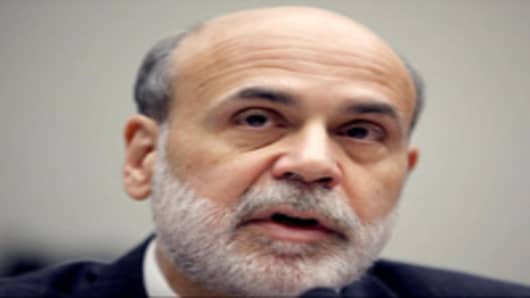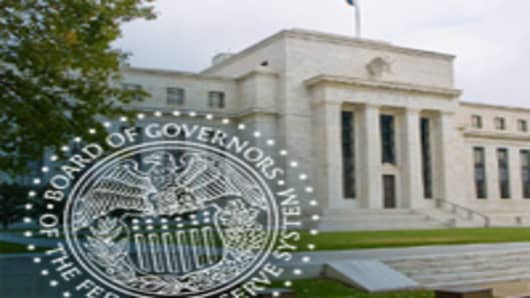Barely five pages, Federal Reserve Ben Bernanke’s Semiannual Monetary Policy Reportto Congress, which was delivered Tuesday before the House and Wednesday before the Senate, is short on detail that will cause significant moves in the financial markets, particularly because the chairman presented nearly identical views in yesterday’s Wall Street Journal-probably to preempt questions from Congress and as an effort to speak directly to the public. In fact, the discussion on the economy, the financial markets, and monetary policy is barely more than two pages. Bernanke’s writing style is to use previous speeches and forecasts as a baseline; hence, just hours after his WSJ articlethere was not much to add.
We see in Bernanke’s testimonyclear efforts to take a stance on issues that Congress wants to meddle in; for example, the proposal to expand the audit authority of the General Accountability Office to include oversight of monetary policy, as well as a strong stance on fiscal policy, which is unusual for Bernanke, who has taken pains to steer clear of the discussion.
The topic du jour these days is of course the Fed’s exit strategy, but market participants will find little fodder in Bernanke’s short commentsabout it and again the Wall Street Journal contains all that one need know for now. Nevertheless, one of Bernanke’s three footnotes refers to four pages (pages 34-37) within the 49-page Monetary Policy Reportto Congress where Bernanke elaborates on the exit strategy. Here again, however, the Wall Street Journal provides the fodder.
Bernanke Heads Back to Capitol Hill and More Questions
(Watch Bernanke Live on CNBC.com starting at 1O am EST)
In both the Journal articleand yesterday’s testimony, Bernanke quickly moved to justify the Federal Reserve’s “aggressive policy actions,” which is meant as both a preemption to members of Congress and a message to the many who are pondering the downside of the Federal Reserve’s actions. Bernanke aimed to take the swords out of the hands of both by hearkening back to the 1930s for the financial crisis and the post World War II period for the economic crisis. Bernanke obviously feels he stands on strong ground with respect to the decisions he and the Federal Reserve have made.
Emphasis on High Unemployment, Low Inflation as Basis for Steady Policy
Bernanke gives no hint that monetary policy will change anytime soon and his referencing both the high level of unemployment and sanguine inflation views presented by Board members and Reserve Bank presidents reinforces the idea that the Fed’s accommodative stance on monetary for some time to come.
This has rallied the bond market and Eurodollar contracts, which correlate tightly with the federal funds rate, have gained significantly. Adding further to this concept is the brevity of Bernanke’s speech: it gives the sense that the Fed has no inclination to even ponder a policy change at the present time and hence need spend very little time talking about it.
“The recovery is expected to be gradual in 2010, with some acceleration in activity in 2011. Although the unemployment rate is projected to peak at the end of this year, the projected declines in 2010 and 2011 would still leave unemployment well above FOMC participants' views of the longer-run sustainable rate. All participants expect that inflation will be somewhat lower this year than in recent years, and most expect it to remain subdued over the next two years.”
The Subtle Shift; Reduced Tail Risks
Although Bernanke made clear that the Fed’s actions have been justified and will stay in place for a while, there is an interesting subtle shift apparent in the speech.
In particular, whereas in past months Bernanke sought to stress the risks of a relapse in economic and financial conditions by couching his more sanguine views with adverbs such as “nonetheless,” “however,” “but,” and “still,” today he did it oppositely by first emphasizing “stressed” financial conditions but then pointing out how they’ve improved:
“Today, financial conditions remain stressed, and many households and businesses are finding credit difficult to obtain. Nevertheless, on net, the past few months have seen some notable improvements. For example, interest rate spreads in short-term money markets, such as the interbank market and the commercial paper market, have continued to narrow.”
Bernanke did the same in describing business spending, talking about the problem first but then throwing in some hope:
“Businesses have continued to cut capital spending and liquidate inventories, but the likely slowdown in the pace of inventory liquidation in coming quarters represents another factor that may support a turnaround in activity.”
In other words, it can be said that Bernanke is less fearful of a relapse than a few months ago, although certainly not enough to impact monetary policy just yet.
Accountability/GAO
Bernanke’s stance on accountability issues is strong. Bernanke is particularly disturbed by the proposal to expand the General Accountability Office’s to go beyond the Federal Reserve’s operations and functions to monetary policy and deliberations. Bernanke believes he has the backing of the financial markets, which he warned “would see a grant of review authority in these areas to the GAO as a serious weakening of monetary policy independence.”
Bonds Rally
Bonds rallied following Bernake's comments. Here are four excuses for the rally:
1) Just as in the WSJ, Bernanke gave no sense that the timing of the exit strategy is near and he continued to emphasize this idea in the Q&A.
2) Bernanke emphasized in his textthat the Fed expects unemployment to remain high and inflation to remain low. Bernanke called inflation fears “misguided.”
3) The brevity of Bernanke’s commentson economic and financial conditions reinforces the idea that there is little debate inside and outside of the Fed regarding its current stance on monetary policy. The activist Fed is hardly on auto-pilot but it is relative to its most recent past.
4) There was no major Congressional scrutiny over idea of keeping rates low for longer; there were no deep concerns expressed about the Fed continuing its aggressive policy actions, and there were no meaningful threats to idea of undercutting the Fed’s independence.
More: Click for Latest Economic coverage ...
And-Watch Bernanke Live on CNBC.com starting at 1O am EST
__________
Tony Crescenzi is Senior VP, Strategist, Portfolio Manager Pimco. Crescenzi makes regular appearances on financial television stations such as CNBC and Bloomberg, and is frequently quoted across the news media. He is also the author of "Investing from the Top Down," "The Strategic Bond Investor," and co-author of the 1200-page book "The Money Market."




